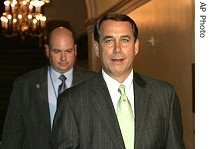2006年VOA标准英语-Republican Leaders Vow Comeback, Maintain Stanc(在线收听)
By Dan Robinson
Washington
17 November 2006
 House Republican Minority Leader John Boehner of Ohio arrives at US Capitol, Thursday, Nov. 16, 2006 |
||
-----
House Republicans faced a choice between two conservative lawmakers, one whose leadership skills have been tested for only 10 months and another who portrayed himself as an agent of change.
One of them is John Boehner, a 57-year-old Ohio lawmaker who won a hotly contested party election last February to replace former Majority Leader Tom DeLay, who stepped down while facing criminal charges in his home state of Texas.
Boehner's rise in the hierarchy had been slow and steady. He established a reputation as an able political operator and articulate spokesman for such key Republican policies as limited government and lower taxes.
He was challenged by Indiana Congressman Mike Pence, an outspoken fiscal conservative and leader of a group of Republicans who favor tighter control of spending.
But it is Boehner, by an overwhelming 168 to 27 vote, who will return to what will be the top post for Republicans in the minority.
He underscored the message of Republicans since they lost the House and the Senate to Democrats: namely that while much work remains, retaking the majority in 2008, also a presidential election year, is within reach. "And to work hard so that we can earn our way back into the majority. And to do that means that we need to fight for a smaller, less-costly and more accountable federal government. But I think the key operative word here, is that we are going to work as a team, and we are going to earn our way back into our majority," he said.
Another familiar face in the present Republican majority leadership will return. Roy Blunt of Missouri won a tight contest with Arizona Congressman John Shadegg for the post of minority whip.
By retaining Boehner and Blunt, it appears a Republicans voted for stability over change, despite calls from factions within the party and conservative spokesmen and commentators for new faces to challenge Democrats.
Since the election, many Republicans have asserted that Americans did not reject conservative values, only Republican failures to stick to and efficiently implement their agenda. Blunt says they have learned from mistakes. "Frankly, to get rid of the bad habits that we may have developed in 12 years in the majority. It is not our job to defend business as usual, not our job to try to define the federal government in the biggest possible way. We need to do the right things. Our conference is ready to do that," he said.
In a separate written statement, Blunt launched a blast at the future Democratic leadership, and incoming House Speaker Nancy Pelosi in particular, saying Republicans will "give Democrats a viable alternative [to Pelosi's] liberal, San Francisco agenda."
In Friday's news conference, Boehner stood firm firmly by President Bush on the issue of Iraq. "Republicans in the Congress want to win in Iraq. I think the president wants to win in Iraq, and most importantly I think the American people want to win in Iraq," he said.
Conspicuously absent from the first Republican leadership news conference was House Speaker Dennis Hastert, who, while re-elected to Congress from his district in Illinois, decided not to pursue a leadership post.
Hastert's final months as speaker were marked by pressure on him and other key Republicans from a congressional and federal probe into inappropriate contacts and e-mail by a former Republican lawmaker Mark Foley with teenage congressional interns.
Senate Republicans chose their leaders earlier this week, with Kentucky Senator Mitch McConnell set to become the future minority leader, and Mississippi's Trent Lott making a political comeback in the number two post.
With future House and Senate majority and minority leaderships set, both parties still need to get through the transitional "lame duck" session, facing the reality of unfinished work such as major appropriations bills required to keep the government running.
Lawmakers return to work for that in the first week of December, aiming if possible to bring the 109th Congress to a formal close no later than the middle of the month.